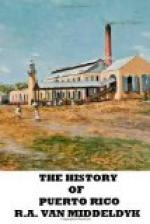The first constitutional regime in Puerto Rico was not abolished till December 3, 1814. For the great majority of the inhabitants of the island at that time the privileges of citizenship had neither meaning nor value. They were still too profoundly ignorant, too desperately poor, to take any interest in what was passing outside of their island. Cock-fighting and horse-racing occupied most of their time. Schools had not increased much since O’Reilly reported the existence of two in 1765. There was an official periodical, the Gazette, in which the Government offered spelling-books for sale to those who wished to learn to read.[48]
During the second constitutional period, Puerto Rico was divided by a resolution in Cortes into 7 judicial districts, and tablets with the constitutional prescriptions on them were ordered to be placed in the plazas of the towns in the interior. Public spirit began to awaken, several patriotic associations were formed, among them those of “the Lovers of Science,” “the Liberals, Lovers of their Country,” and others. But the dawn of progress was eclipsed again toward the end of 1823, when the news of the fall of the second constitutional regime reached Puerto Rico a few months after the people had elected their deputies to Cortes.
FOOTNOTES:
[Footnote 47: The King of England.]
[Footnote 48: Neuman, p. 354.]
CHAPTER XXIV
GENERAL CONDITION OF THE ISLAND
FROM 1815 TO 1833
That Ferdinand should, while engaged in cruel persecution of his best subjects in the Peninsula, think of dictating liberal laws for this island is an anomaly which can be explained only by its small political importance.
In August, 1815, there appeared a decree entitled “Regulations for promoting the population, commerce, industry, and agriculture of Puerto Rico.” It embraced every object, and provided for all the various incidents that could instil life and vigor into an infant colony. It held out the most flattering prospects to industrious and enterprising foreigners. It conferred the rights and privileges of Spaniards on them and their children. Lands were granted to them gratis, and no expenses attended the issue of titles and legal documents constituting it private property. The quantity of land allotted was in proportion to the number of slaves introduced by each new settler. The new colonists were not to be subject to taxes or export duty on their produce, or import duties on their agricultural implements. If war should be declared between Spain and their native country, their persons and properties were to be respected, and if they wished to leave the island they were permitted to realize on their property and carry its value along with them, paying 10 per cent on the surplus of the




